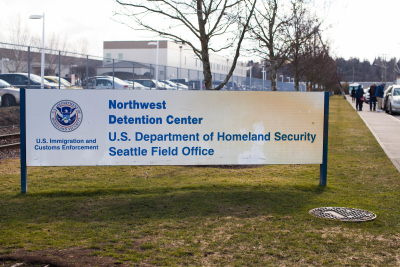
Terminator: Dark Fate Movie Review

Terminator: Dark Fate
2019
The latest installment in the Terminator movies takes up where Terminator II left off. In this timeline the A.I. called Legion has achieved consciousness and seeks to wipe humynity from the earth. The plot continues the theme of humyns fighting the machines after a nuclear holocaust, with the future pivoting on the life of one persyn.
This movie features more gender and nation diversity than the previous Terminators. All the humyn heroes are female. And it moves beyond the U.$. borders to Mexico where the new target of the Terminator lives. In Dark Fate the Terminator was sent back in time to kill Dani Ramos. A cybernetically-enhanced soldier, Grace, was also sent back in time, to protect Dani. And Sarah Connor, target from the previous Terminator movies, shows up to help with Dani’s protection.
There are a few interesting themes to the Terminator movies that continue in Dark Fate. First there is the nuclear destruction of humynity. The earth and most of life on it has been wiped out. People need to take seriously the dark possibility that humynity is driving towards this destruction. It may not include a conscious A.I. wiping out the few humyns who survive. But capitalism is on a firm march towards annihilation of the current balance of life on Earth that humyns depend on. It is not sustainable. And so movies that pose this possible future, brought about by the actions of humyns, are good for the ideas they can provoke.
Another general theme of the Terminator movies is that one persyn is pivotal to the entirety of humyn existence. In previous movies that persyn was John Connor, the unborn child of Sarah Connor. And so the Terminators went back in time to try to kill Sarah to prevent the birth of John to stop em from leading the resistance that could defeat the Terminators. In Dark Fate the one persyn is Dani Ramos. In this case it’s not Dani’s womb that needs protection/destruction, it’s Dani eirself, who will lead the resistance.
We might read into Dark Fate that it’s not actually about individuals. After all, John Connor died but now we have Dani. Humynity and its conditions creates these leaders. But for the most part the movie is pushing a message that history is created by one individual who must be protected or destroyed at all cost. Humyns would not have united against the Legion without Dani. So the Legion must send a Terminator back in time to destroy Dani, and the resistance must send a soldier back to protect Dani. That’s a lot of resources and energy spent on one persyn.
Dark Fate is consistent with the bourgeois theory of history, a spin on history that focuses on the accomplishments of individuals, removing them from the political context of their time. Communists, on the other hand, don’t see Dani, or John, or the other humyn resistance leaders as uniquely qualified for their roles. Instead we see them as a product of the political conditions. They did what was necessary to fight for the survival of humynity. And in their absence others would have done the same.
The idea that only certain special individuals are able to take leadership roles fits in with a religious/capitalist way of thinking. Humynity may be moving towards destruction, but there’s nothing average folks can do about it. Only special heroes can make a difference. This way of thinking discourages people from taking up the fight for a better future. And instead suggests it’s best to just believe in a leader without question.
Maoists, on the other hand, see no individuals as infallible. In fact, a fundamental tenant of Maoism is the need for continuous cultural revolution under the dictatorship of the proletariat, in which the people are actively critical of and struggling with socialist leaders and one another. This includes removing from positions of power those who have strayed off the revolutionary path. The future lies in the hands of the people, and so the people must learn through struggle in order for us to discover the correct way forward.
The earlier Terminator movies had a good slogan from Sarah and John Connor: “No Fate But What We Make.” This was a mantra that John repeated to himself and others to remember that the future can be changed. This is a good counter to the idea that humynity is fated to nuclear destruction and the rise of conscious anti-humyn A.I.s. And that only John, or only Dani, can lead a successful resistance. Perhaps the A.I.s, in their limited world view, believe this to be true. But humyns should be focused on stopping the nuclear destruction and A.I. consciousness event before it happens. It is unfortunate that Dark Fate takes into its title the antithesis of this anti-fate slogan, and perpetuates that message in the plot.
The movie misses a great opportunity to avoid this idea of fate at the end, when discussing the future of one young character. The goal that this character not die in battle later in life is a good one, and a sign that potentially fate can be changed. But the assumption that the way to do this is to start military training for the post-apocalyptic battle now, rather than fight to keep humynity from destroying itself, is an unfortunate ending.
Check out other movie reviews, from the old MIM website, including a review of Terminator 3.








